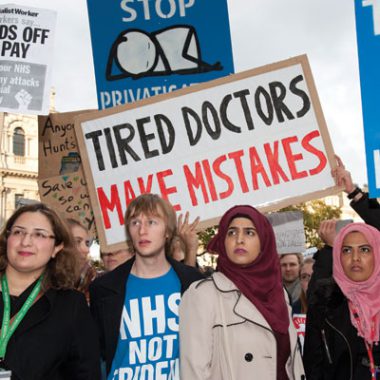Junior doctors to stage full walk-out under BMA plans for industrial action

The BMA is proposing that junior doctors stage a full walk-out, with no provision of emergency care, if members vote in favour of industrial action.
Its council today agreed the details of the potential industrial action, on which it is currently balloting junior doctor members.
If members vote in favour of industrial action, junior doctors would provide emergency care only for 24 hours from 8am on Tuesday 1 December.
This will be followed by a full walk-out from 8am to 5pm on Tuesday 8 December, and another at the same time on Wednesday 16 December.
This is in contrast to the industrial action held in 2012 in protest at the pensions changes, during which doctors continued to provide emergency care.
The industrial action is being proposed amid an ongoing row between the BMA’s Junior Doctors Committee and the Government, which has threatened to impose a contract on trainees that will see them given far less reward for weekend working and will remove safeguards around safe working hours.
Under the Government’s proposals, GP trainees would see the removal of a guaranteed supplement that ensures they are receive pay parity with their secondary care collegues.
The BMA has said it is releasing the details at this early stage ‘in order to ensure that the necessary cover can be put in place to minimise disruption to other NHS staff and, above all, to patients’.
Dr Mark Porter, BMA council chair, said: ‘Our dispute is with the Government and our ballot for industrial action is a last resort in the face of their continued threat to impose a new contract.
‘Industrial action is the last resort for a reason: it comes only when every other avenue has been exhausted.
‘The BMA has been explicit in what it needs to change in junior doctor contract proposals. The Government’s refusal to work with us through genuine negotiations, and its continued threat to impose an unsafe and unfair contract leaves us with no alternative.’
Health secretary Jeremy Hunt had stepped in with a last-minute offer on the eve of the ballot opening, which he claimed would see junior doctors being given an 11% increase to basic pay.
However, the BMA has repeatedly said that it will negotiate with the Government only when Mr Hunt lifts his threat of a contract imposition, while Government claims that only 1% of doctors will receive a pay reduction have been questioned.
Pulse revealed that the vast majority of senior GPs supported GP registrars and junior doctors taking industrial action, while the GP trainees surveyed said they would vote in favour of the proposals.
Dr Louise Clift, a GP registrar in Gloucestershire, said she would be voting in favour of industrial action, and dismissed claims that the new offer would result in a pay rise,
She said: ’Jeremy Hunt is completely barking up the wrong tree if he thinks he can pull the wool over our eyes with an ”11% pay rise”. This is nothing more than a pay cut for me and the majority of my junior doctor colleagues.’
Danny Mortimer, chief executive of NHS Employers, said: ’We know this will have a huge impact on patient care and we urge the BMA to avoid putting patients and the NHS in this position by returning to talks with us.
’Proposed strike action, as outlined by the BMA would be hugely regrettable. Employers across the NHS will be extremely disappointed and anxious about the difficult situation they will find themselves in to make sure work schedules are met and patient care is not compromised.’
The ballot closes on 18 November.









